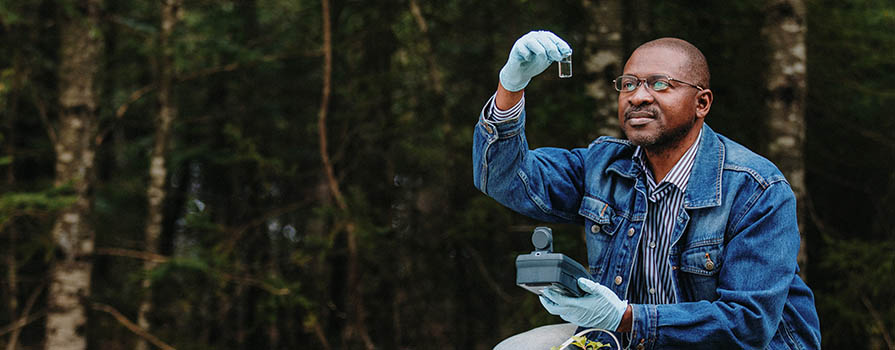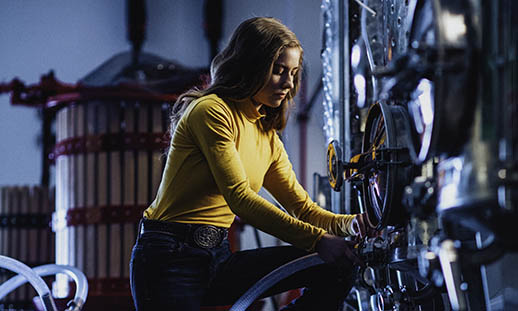Testing the water

Access to clean water isn’t something most Nova Scotians worry about. However, in Shelburne's south end, residents fear that contaminants are leaching into their wells and impacting their health.
“I grew up in Cameroon where millions of people live without access to safe water,” says Dr. Etienne Mfoumou, Lead Research Scientist for NSCC's Engineered Technologies Applied Research Lab. “This isn’t an issue I expected to see in Canada – everyone, everywhere in the world should have the right to clean water.”
Only 25 per cent of Shelburne’s residents have access to the public water system. The remaining 75 per cent rely on wells, which fall under the responsibility of the homeowner. Individuals living in the south end, a predominantly black community, have voiced concerns. Testing conducted in 2018 by the Rural Water Watch Association on 24 wells in the area have shown that coliform bacteria and E. coli are present in nearly all wells and the water is not safe to drink. The source of the contamination is still unknown.
I’m so pleased NSCC came onboard — using their expertise in applied research to find a sustainable solution to Shelburne's water issues. The College and the Rural Water Watch (RWW) are working to ensure that all residents have access to clean, safe drinking water.
A community-based research project
Etienne says he first became involved in the Shelburne Water Project after NSCC co-worker and president of the Rural Water Watch Association, Wilber Menendez-Sanchez, told him about Shelburne’s plight and his organization’s mission — to equip rural Nova Scotian communities with the knowledge, skills, literacy and resources they require to address drinking water quality concerns in their communities.
“Once I understood the severity of the situation, I wanted to get involved,” says Etienne.
On October 18, 2018, Etienne and his team from Ivany Campus — where the lab is located — hosted a public information session at Shelburne Campus to publicly launch a two-year study to uncover a cost-effective, water-filtration solution for residents.
“It’s a unique experience, there’s a lot at stake,” says Etienne. “The honest input from residents during the community meeting gave us a real sense of the situation and helped us narrow down what types of systems we should test. The findings from this project are potentially going to better the lives of so many people — that’s pretty gratifying.”
The clean water solution
The team is currently testing two different water filtration systems.
“Advanced ultrafiltration works like a coffee filter. Only instead of straining coffee grinds, it uses a filter to remove contaminants in the water. It’s slightly more complex as it’s a two-step process and the filter needs to remain clean and clear of residue too.”
One of the systems is being tested at the household level and another at a community level. The differences between the two systems relate to size, capacity and cost. The larger of the two systems can filter 25,000 litres of water – or enough for four households. The smaller unit is about the size of a large suitcase and can filter 6,000 litres. It can also be deployed at a home.
Etienne says that ultrafiltration systems are generally easy to use and don’t require a lot of maintenance. This will be important if homeowners manage the systems on their own in the future.
Teaching and learning
In addition to recommending which system will work best for the community, NSCC is also developing a training manual that will teach homeowners how to clean their wells and take water samples.
Etienne says the technology and research approach used for this project will also benefit other communities. “There are quite a few communities in Nova Scotia with their own unique drinking water challenges. So, we don’t plan on stopping here. We’re also building a mobile trailer that will allow us to bring this solution to other areas of the province.”
Collaborating with community partners:
This work is being completed in partnership with — and because of the ongoing contributions of — a number of individuals and groups:
- Shelburne’s south end community
- Dr. Ingrid Waldron
- Dalhousie University's Environmental Noxiousness, Racial Inequities and Community Health Project (ENRICH)
- The South-End Environmental Injustice Society (SEED)
- Rural Water Watch (RWW)
- Acadia University
- Research Nova Scotia
Fast Fact
Dr. Mfoumou’s team is building a mobile water testing lab to help more Nova Scotian communities test and manage their drinking water resources. NSCC students have helped lay out the plumbing and design the trailer.
Related Stories
 A world of possibilities
A world of possibilities
Valedictorian assists entrepreneurs in Peru and Vietnam with NSCC International.


